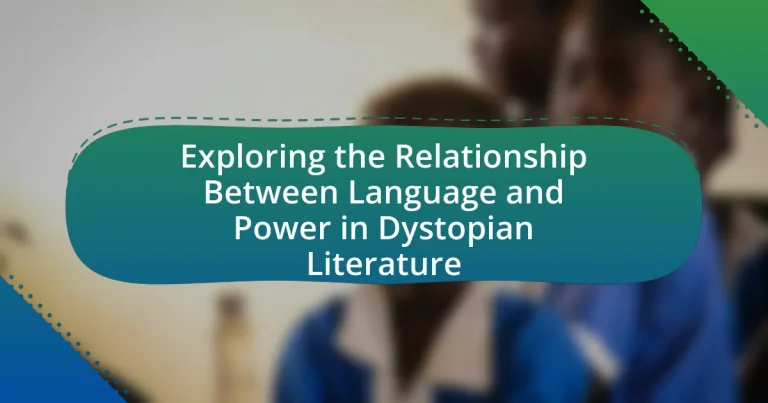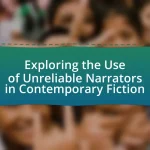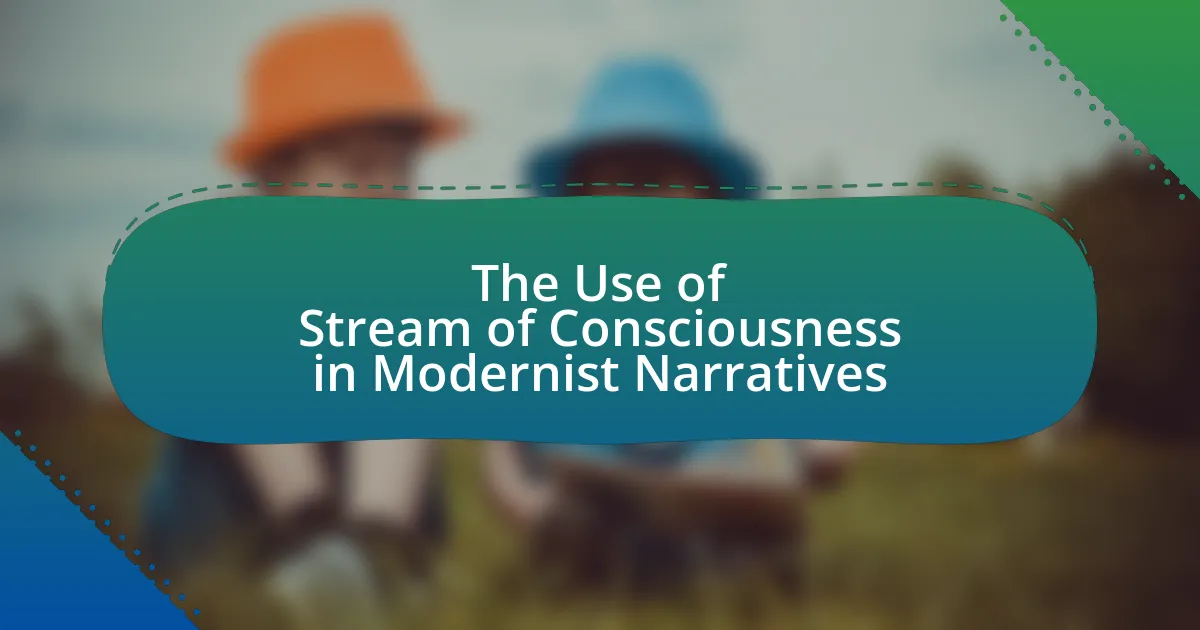The article explores the intricate relationship between language and power in dystopian literature, highlighting how language functions as a tool for control and oppression. It examines key concepts such as linguistic manipulation, propaganda, and the impact of language on individual autonomy and social hierarchies, with notable references to George Orwell’s “1984” and Margaret Atwood’s “The Handmaid’s Tale.” The discussion includes historical contexts that shape language use, the portrayal of power dynamics, and the implications for contemporary society, emphasizing the importance of linguistic awareness in resisting authoritarian control. Through various examples, the article illustrates how language not only reflects but also reinforces power structures within dystopian narratives.
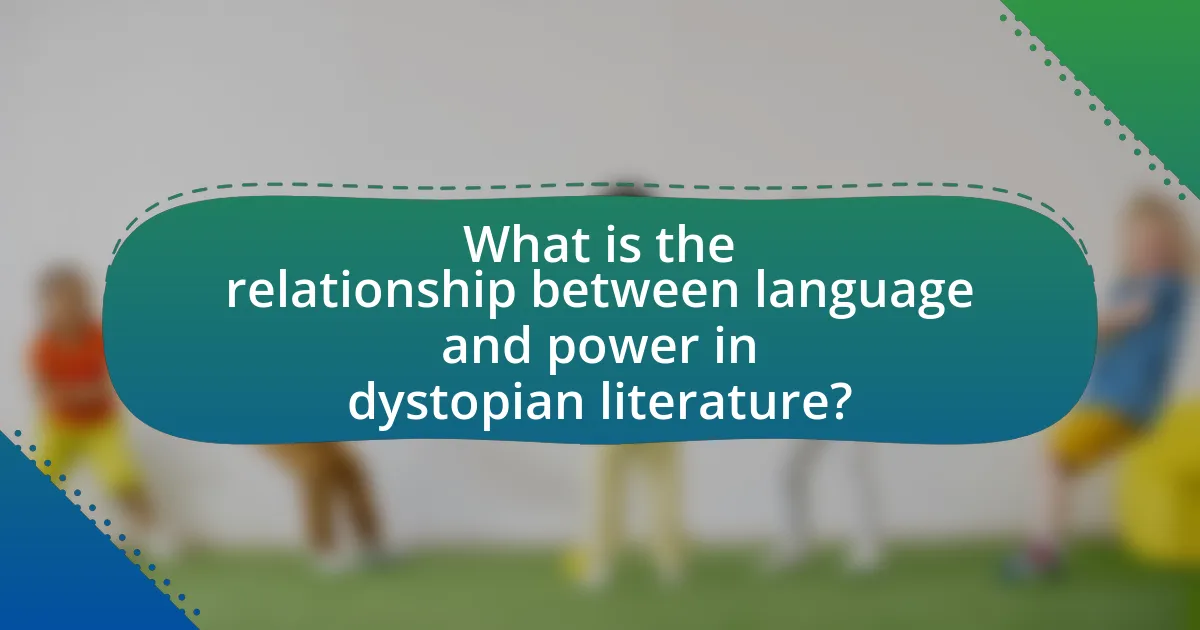
What is the relationship between language and power in dystopian literature?
In dystopian literature, language serves as a tool of power, enabling control over thought and behavior. Authoritarian regimes often manipulate language to suppress dissent and shape reality, as seen in George Orwell’s “1984,” where Newspeak limits the range of thought by reducing vocabulary. This linguistic control illustrates how power structures can dictate societal norms and individual beliefs, reinforcing the idea that language is not merely a means of communication but a mechanism of oppression. The relationship between language and power is thus characterized by the ability of those in authority to define and restrict language, ultimately influencing the populace’s perception of truth and freedom.
How does language shape power dynamics in dystopian societies?
Language shapes power dynamics in dystopian societies by controlling thought and limiting freedom of expression. In these societies, language is often manipulated to reinforce the authority of the ruling regime, as seen in George Orwell’s “1984,” where the concept of Newspeak is designed to eliminate dissent by reducing the range of thought. This linguistic control enables those in power to dictate reality, as the manipulation of language can distort truth and suppress individualism. Historical examples, such as totalitarian regimes that employed propaganda and censorship, demonstrate how language can be weaponized to maintain dominance and suppress opposition.
What role does propaganda play in controlling language and thought?
Propaganda plays a crucial role in controlling language and thought by shaping perceptions and influencing beliefs through carefully crafted messages. It manipulates language to create a specific narrative that aligns with the interests of those in power, often simplifying complex issues into binary choices, which limits critical thinking. Historical examples, such as George Orwell’s “1984,” illustrate how the regime uses Newspeak to restrict the range of thought by eliminating words that could express dissent or rebellion. This linguistic control effectively alters reality, as individuals internalize the propaganda, leading to a conformist mindset that supports the ruling ideology.
How does the manipulation of language affect individual autonomy?
The manipulation of language significantly undermines individual autonomy by constraining thought and limiting personal expression. In dystopian literature, such as George Orwell’s “1984,” the concept of Newspeak illustrates how language can be altered to restrict the range of thought, thereby controlling the populace. By reducing the complexity of language, the regime effectively diminishes the ability of individuals to articulate dissent or even conceive of rebellion, as the vocabulary necessary for such thoughts is systematically eliminated. This demonstrates that when language is manipulated, it directly impacts the capacity for independent thought and self-determination, leading to a loss of personal agency.
Why is language a tool for oppression in dystopian narratives?
Language serves as a tool for oppression in dystopian narratives by enabling the manipulation of thought and control over individuals. In these narratives, regimes often employ language to restrict freedom of expression, enforce conformity, and alter reality, exemplified by George Orwell’s “1984,” where the concept of Newspeak is designed to eliminate dissent by reducing the complexity of language. This reduction limits the ability to conceptualize rebellion or individuality, effectively controlling the populace’s thoughts and actions. Furthermore, the use of euphemisms and propaganda in dystopian settings distorts truth, reinforcing the power of oppressive authorities and maintaining their dominance over society.
What examples illustrate the use of language as a means of control?
Language serves as a means of control in dystopian literature through mechanisms such as Newspeak in George Orwell’s “1984,” where the reduction of language limits thought and expression, effectively controlling the populace. In this novel, the government manipulates language to eliminate dissent and enforce conformity, demonstrating how linguistic restrictions can suppress individual freedom. Another example is the use of propaganda in Ray Bradbury’s “Fahrenheit 451,” where the state employs euphemisms and censorship to control information and maintain power, illustrating the impact of language on societal norms and beliefs. These examples highlight the critical role language plays in shaping power dynamics and controlling populations in dystopian settings.
How do characters in dystopian literature resist linguistic oppression?
Characters in dystopian literature resist linguistic oppression by reclaiming language as a tool for personal and collective empowerment. For instance, in George Orwell’s “1984,” Winston Smith engages in thoughtcrime by writing in a secret journal, defying the Party’s control over language and thought. This act symbolizes resistance against the oppressive regime that seeks to limit expression and manipulate reality through Newspeak. Additionally, in Margaret Atwood’s “The Handmaid’s Tale,” Offred uses storytelling as a means to assert her identity and resist the totalitarian control of Gilead, demonstrating how personal narratives can challenge linguistic subjugation. These examples illustrate that characters actively engage with language to undermine oppressive systems and assert their autonomy.
What are the implications of language on social hierarchies in dystopian worlds?
Language serves as a critical tool for establishing and maintaining social hierarchies in dystopian worlds. In these settings, the manipulation of language often reflects and reinforces power dynamics, where those in authority control discourse to suppress dissent and shape societal norms. For instance, in George Orwell’s “1984,” the regime employs Newspeak to limit the range of thought, effectively constraining individual expression and reinforcing the Party’s dominance. This linguistic control not only marginalizes dissenting voices but also creates a populace that is less capable of conceptualizing rebellion, thereby solidifying the existing social order. Additionally, the use of specialized jargon or coded language can create barriers that exclude certain groups from power, further entrenching social stratification. Thus, language in dystopian contexts is not merely a means of communication but a mechanism of control that shapes social hierarchies and influences the distribution of power.
How does language create or reinforce class divisions?
Language creates and reinforces class divisions by establishing social hierarchies through the use of specific dialects, jargon, and linguistic styles that signal status and education. For instance, in many societies, the use of formal language and complex vocabulary is often associated with higher social classes, while colloquial speech may be linked to lower socioeconomic status. This distinction can lead to discrimination, as individuals from lower classes may be perceived as less intelligent or capable based solely on their language use. Research shows that linguistic discrimination can affect job opportunities and social mobility, reinforcing existing class structures. Studies, such as those by sociolinguist William Labov, demonstrate how language variation correlates with social stratification, highlighting the role of language in perpetuating class divisions.
What linguistic features signify power and authority in these texts?
Linguistic features that signify power and authority in dystopian literature include the use of imperative verbs, formal language, and specialized vocabulary. Imperative verbs, such as “must” or “shall,” convey commands and assert control, establishing dominance over characters and situations. Formal language often reflects social hierarchies, reinforcing the authority of characters in positions of power. Additionally, specialized vocabulary, particularly jargon or technical terms, can create an exclusive discourse that emphasizes the knowledge and authority of those in power, as seen in works like George Orwell’s “1984,” where the manipulation of language serves to control thought and maintain the regime’s dominance.
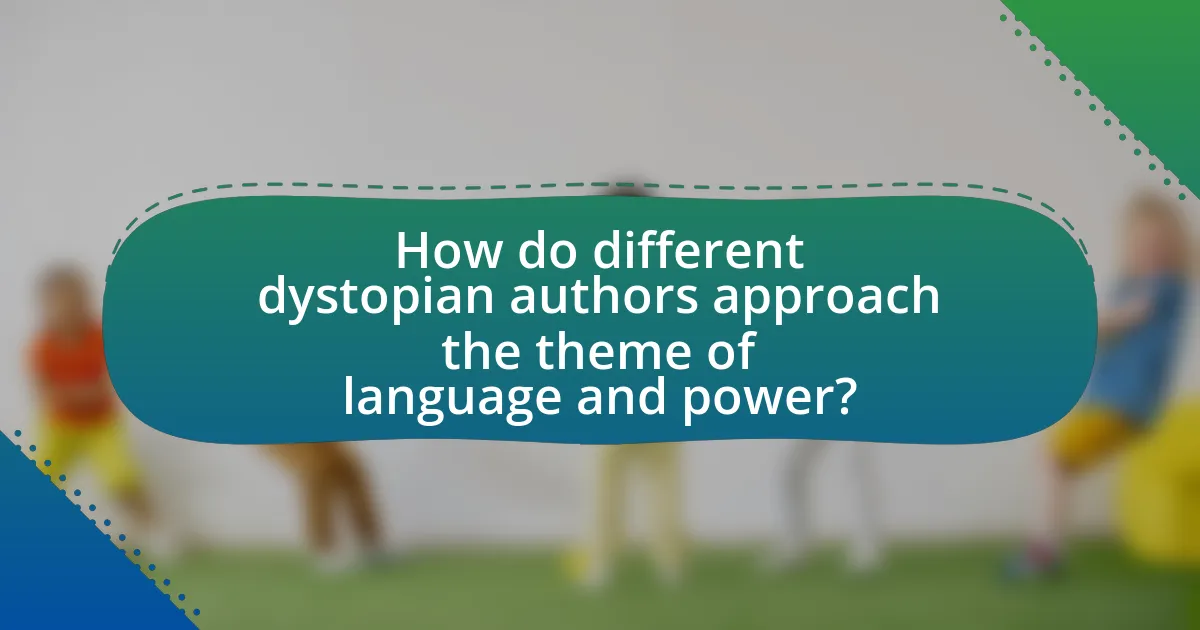
How do different dystopian authors approach the theme of language and power?
Different dystopian authors approach the theme of language and power by illustrating how language can be manipulated to control thought and behavior. George Orwell’s “1984” exemplifies this through the concept of Newspeak, a language designed to limit freedom of thought and expression, thereby consolidating the Party’s power. Similarly, Margaret Atwood’s “The Handmaid’s Tale” demonstrates how language is weaponized to enforce patriarchal control, as seen in the use of terms like “Handmaid” to strip women of their identities and autonomy. In contrast, Anthony Burgess’s “A Clockwork Orange” showcases the use of a constructed slang, Nadsat, which serves to alienate and empower the youth, reflecting the complexities of language as both a tool of rebellion and oppression. These authors collectively highlight that language is not merely a means of communication but a powerful instrument that shapes societal structures and individual agency.
What techniques do authors use to depict the relationship between language and power?
Authors depict the relationship between language and power through techniques such as manipulation of dialogue, symbolism, and the use of controlled language. Manipulation of dialogue illustrates how characters wield language to assert dominance or control, as seen in George Orwell’s “1984,” where the Party uses Newspeak to limit thought. Symbolism often represents the power dynamics inherent in language; for instance, in Margaret Atwood’s “The Handmaid’s Tale,” the use of biblical language signifies theocratic control over women’s bodies and identities. Controlled language, as demonstrated in dystopian narratives, serves to restrict freedom of expression and thought, reinforcing the idea that language is a tool for oppression. These techniques collectively highlight how language can be both a means of empowerment and a mechanism of control in societal structures.
How does George Orwell’s “1984” illustrate the manipulation of language?
George Orwell’s “1984” illustrates the manipulation of language through the concept of Newspeak, a controlled language designed to limit freedom of thought. Newspeak systematically reduces the complexity of language, eliminating words that express dissent or rebellion, thereby constraining the range of thought and expression. For example, the word “freedom” is replaced with “slavery,” which exemplifies how language can be twisted to serve the interests of totalitarian control. This manipulation is further evidenced by the Party’s slogan, “War is Peace, Freedom is Slavery, Ignorance is Strength,” which demonstrates the paradoxical use of language to distort reality and maintain power. Through these mechanisms, Orwell effectively shows how language can be weaponized to suppress individuality and enforce ideological conformity.
What linguistic strategies are employed in Margaret Atwood’s “The Handmaid’s Tale”?
Margaret Atwood employs various linguistic strategies in “The Handmaid’s Tale” to illustrate the relationship between language and power. These strategies include the use of neologisms, symbolism, and a fragmented narrative structure. Neologisms, such as “Handmaid” and “Unwoman,” create a new lexicon that reflects the oppressive societal roles imposed on women, emphasizing their subjugation. Symbolism is prevalent, with language serving as a tool for control; for instance, the term “Blessed be the fruit” reinforces the regime’s focus on reproduction. The fragmented narrative structure mirrors the protagonist’s psychological state, highlighting the disconnection and trauma experienced under totalitarian rule. These strategies collectively underscore how language shapes identity and enforces power dynamics within the dystopian setting.
How do cultural contexts influence the portrayal of language and power?
Cultural contexts significantly influence the portrayal of language and power by shaping the meanings and implications of language within specific societal frameworks. For instance, in dystopian literature, language often reflects the values, ideologies, and power structures of the culture depicted, as seen in George Orwell’s “1984,” where the manipulation of language through Newspeak serves to control thought and suppress dissent. This illustrates how cultural norms dictate the function of language as a tool of power, reinforcing the idea that language is not merely a means of communication but a mechanism for social control. The portrayal of language in such contexts reveals the underlying power dynamics, demonstrating that the way language is used can either empower individuals or subjugate them, depending on the cultural backdrop.
What historical events shape the language used in dystopian literature?
The language used in dystopian literature is shaped significantly by historical events such as totalitarian regimes, the World Wars, and the Cold War. Totalitarian regimes, exemplified by Nazi Germany and Stalinist Russia, influenced authors like George Orwell and Aldous Huxley, who depicted oppressive governments manipulating language to control thought and suppress dissent. The aftermath of World War I and World War II led to a disillusionment with authority and a focus on themes of surveillance and propaganda, as seen in works like “1984.” Additionally, the Cold War era introduced fears of nuclear annihilation and ideological conflict, prompting writers to explore the consequences of political power on individual freedoms and language, as reflected in Ray Bradbury’s “Fahrenheit 451.” These historical contexts provide a framework for understanding how language in dystopian literature serves as a tool for both oppression and resistance.
How do different cultures interpret the relationship between language and authority?
Different cultures interpret the relationship between language and authority in varied ways, often reflecting their historical, social, and political contexts. For instance, in many Western cultures, language is viewed as a tool for empowerment and individual expression, where authority is challenged through rhetoric and discourse, as seen in democratic movements that emphasize free speech. Conversely, in some Eastern cultures, language may be perceived as a means to uphold social harmony and respect for authority, where hierarchical structures dictate communication styles, as illustrated by the use of honorifics in languages like Japanese and Korean. These interpretations are supported by sociolinguistic studies that show how language shapes power dynamics, such as the work of Pierre Bourdieu, who argued that language is a form of capital that can reinforce or challenge social hierarchies.
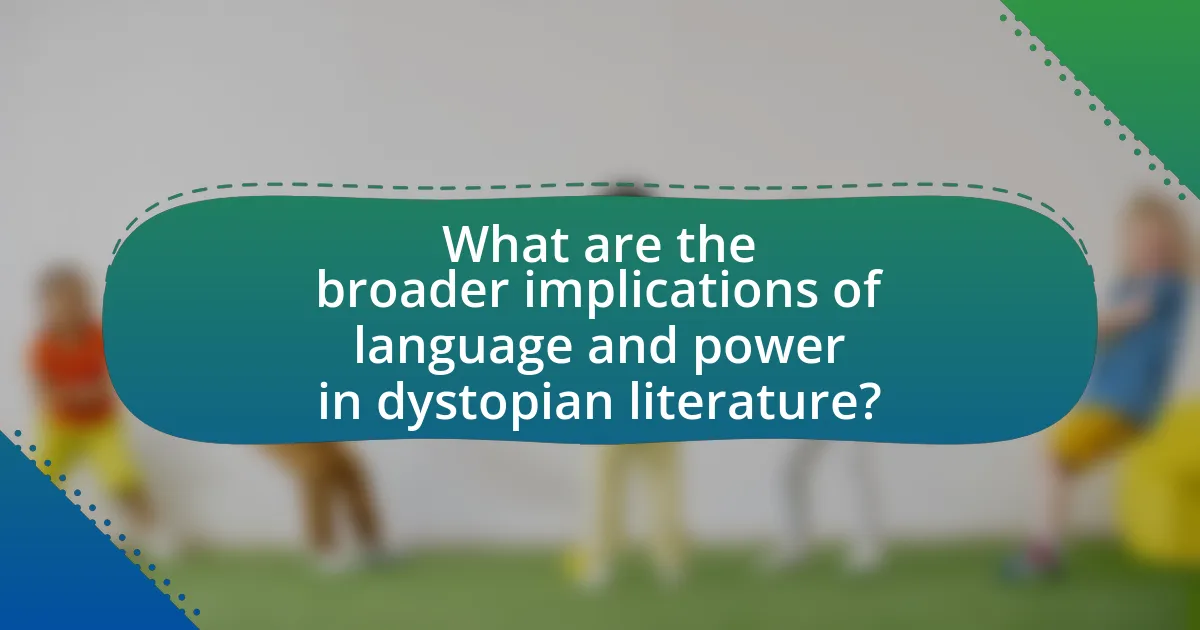
What are the broader implications of language and power in dystopian literature?
Language serves as a critical tool for power dynamics in dystopian literature, often illustrating how control over language equates to control over thought and behavior. In works like George Orwell’s “1984,” the concept of Newspeak demonstrates how the manipulation of language can limit freedom of expression and thought, effectively subjugating the populace. This reflects the broader implication that language is not merely a means of communication but a mechanism of oppression, shaping societal norms and individual identities. The use of euphemisms and propaganda in dystopian narratives further emphasizes how language can distort reality, enabling authoritarian regimes to maintain power by controlling the narrative and suppressing dissent. Thus, the interplay between language and power in dystopian literature reveals the potential for linguistic manipulation to undermine democracy and individual autonomy.
How does the exploration of language and power reflect real-world issues?
The exploration of language and power reflects real-world issues by illustrating how control over language can manipulate societal structures and influence individual thought. In dystopian literature, such as George Orwell’s “1984,” the concept of Newspeak demonstrates how reducing the complexity of language limits freedom of thought and expression, mirroring real-world authoritarian regimes that restrict language to maintain power. Historical examples include the use of propaganda in totalitarian states, where language is crafted to shape public perception and suppress dissent, highlighting the critical relationship between linguistic control and social order.
What parallels can be drawn between dystopian language control and contemporary society?
Dystopian language control often manifests in contemporary society through mechanisms of censorship, manipulation of information, and the shaping of public discourse. In dystopian narratives, such as George Orwell’s “1984,” language is restricted to limit thought and suppress dissent, exemplified by the concept of Newspeak, which reduces the complexity of language to eliminate rebellious ideas. Similarly, in contemporary society, governments and corporations may engage in practices that limit free expression, such as social media censorship or the promotion of specific narratives that align with their interests. For instance, the rise of “fake news” and misinformation campaigns can distort public understanding and influence political outcomes, paralleling the language manipulation seen in dystopian literature. These practices highlight the ongoing struggle over language as a tool of power, where controlling discourse can lead to the erosion of critical thought and individual autonomy.
How does language influence public perception and political discourse today?
Language significantly influences public perception and political discourse today by shaping narratives and framing issues. The choice of words, tone, and rhetoric can evoke specific emotions and reactions, thereby guiding public opinion. For instance, political leaders often use loaded language to create a sense of urgency or fear, which can mobilize support or opposition. Research shows that the framing of issues, such as immigration or climate change, can alter public attitudes; for example, describing immigrants as “refugees” versus “illegals” can lead to more empathetic responses. Furthermore, social media amplifies this effect, as concise language and hashtags can quickly spread ideas and influence collective perceptions.
What lessons can readers learn from the relationship between language and power in dystopian literature?
Readers can learn that language serves as a tool for both oppression and resistance in dystopian literature. In works like George Orwell’s “1984,” the manipulation of language through Newspeak illustrates how controlling language can limit thought and maintain power. This demonstrates that the reduction of vocabulary can lead to a reduction in critical thinking, thereby reinforcing authoritarian control. Additionally, the use of propaganda in dystopian narratives shows how language can be weaponized to distort reality and manipulate public perception, as seen in Ray Bradbury’s “Fahrenheit 451,” where censorship leads to societal ignorance. These examples highlight the critical importance of language in shaping power dynamics and the necessity for vigilance in preserving linguistic freedom to safeguard against tyranny.
How can understanding this relationship empower individuals in their own lives?
Understanding the relationship between language and power in dystopian literature empowers individuals by providing insight into how language can shape perceptions, influence behavior, and control societies. This understanding enables individuals to critically analyze the language used in their own environments, recognizing manipulative rhetoric and the potential for language to both liberate and oppress. For instance, George Orwell’s “1984” illustrates how language can be weaponized to limit thought and maintain authoritarian control, highlighting the importance of linguistic awareness in resisting such manipulation. By grasping these dynamics, individuals can cultivate a more informed and proactive stance in their personal and social interactions, ultimately fostering empowerment and agency in their lives.
What strategies can be employed to resist linguistic manipulation in society?
To resist linguistic manipulation in society, individuals can employ critical thinking, media literacy, and active engagement in discourse. Critical thinking enables individuals to analyze language and identify biases or manipulative tactics used in communication. Media literacy equips people with the skills to evaluate sources, discern misinformation, and understand the context of language used in various media. Active engagement in discourse encourages open dialogue and the questioning of dominant narratives, fostering a culture of accountability and transparency. These strategies collectively empower individuals to recognize and challenge linguistic manipulation, thereby promoting a more informed and resilient society.
